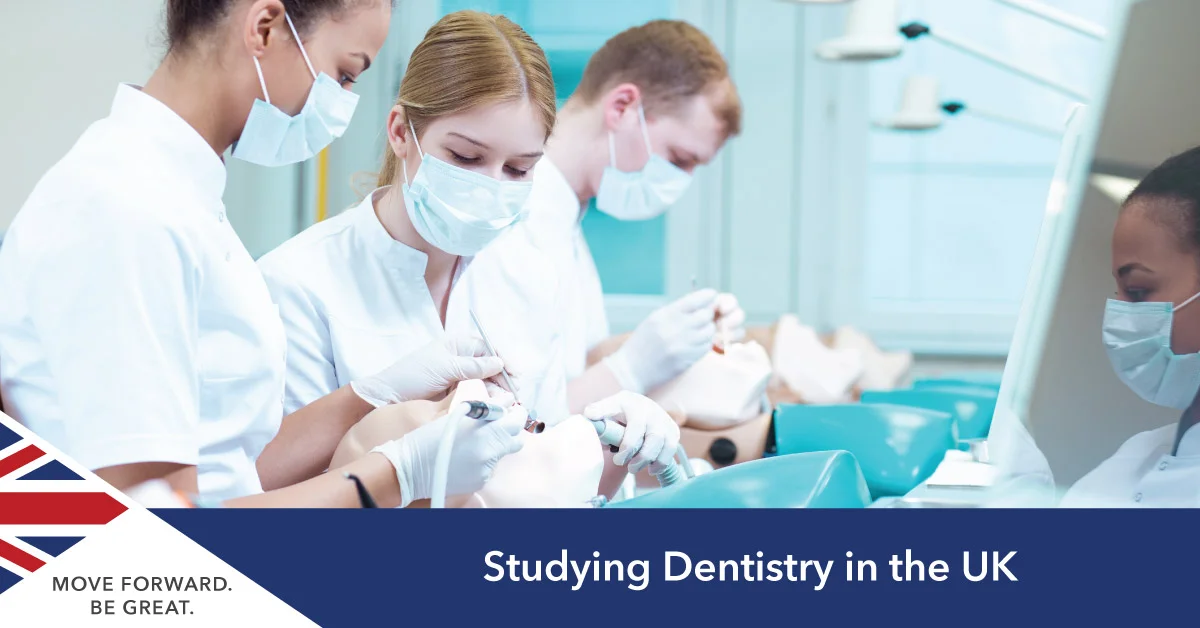Dental hygienists maintain and promote oral health by providing services and advice designed to help patients manage the condition of their mouths, teeth and gums. They also complete preventative activities such as fissure sealants on adults and children.
A three-year bachelor's degree in dental hygiene will include integrated and compulsory units of academic teaching, clinical skills and practice, and a dissertation comprising taught components in didactics, scientific research and a personal investigation. Candidates will learn the essentials of the relevant theory before they start practical work at an accredited clinical facility, taking treatment in both the private and public sectors.
Learn more about studying dental hygienist courses in the UK and arrange a free consultation with SI-UK London today to begin your application.

What is a Dental Hygienist?
A dental hygienist is a healthcare professional who specialises in oral health under the supervision of a dentist. More often called dental hygienists, they focus on preventative oral healthcare by cleaning patients' teeth, examining gums and flossing.
These professionals also perform basic dental procedures such as removing plaque and tartar from patients' teeth and checking for signs of oral cancer during routine check-ups. Some of the duties that they are in charge of, but not limited to, are:
- Cleaning teeth with dental instruments
- Reviewing patient's medical history as well as maintaining accurate records
- Inspecting patients' lymph nodes for signs of swelling and identifying signs of oral cancer
- Examining & probing gums to check for any signs of periodontal disease
- Performing X-rays
- Recording the symptoms of oral disease for the dentist to review and diagnose
- Cleaning, sterilising and organising dental equipment
Top 10 Dental Hygiene Universities in the UK
Below is the list of the top ten universities in the UK for dental hygiene, according to the Guardian University Guide 2024.
1. University of Bristol
Based in the heart of Bristol, the University of Bristol is known for its academic distinction and cutting-edge research. Its dental hospital has a long and established history of training programmes in dental hygiene and dentistry therapy. The BSc Dental Hygiene and Therapy degree from Bristol will provide an exciting opportunity to study alongside undergraduate students in the BDS Dentistry course.
- Suggested course: BSc Dental Hygiene and Therapy
- Entry requirements: International Baccalaureate Diploma: 32 points overall with 16 at Higher Level, including 5 at Higher Level in Biology.
2. University of Birmingham
The University of Birmingham has emerged as a powerhouse in dental education, consistently setting high standards for academic excellence. Birmingham's BSc (Hons) Dental Hygiene & Therapy programme combines a strong theoretical foundation with extensive clinical training. Students benefit from a curriculum designed to nurture critical thinking and practical skills essential for success in the dynamic field of dental health.
- Suggested course: BSc (Hons) Dental Hygiene & Therapy
- Entry requirements: IB - 5, 5, 5 at Higher Level (to include biology and preferably chemistry) with a minimum of 32 points overall.
3. Newcastle University
Newcastle University offers a degree in dental hygiene that begins with a foundation course in biomedical sciences that will provide a basis for clinical work as the course progresses. Students will study advanced topics, including human diseases, health promotions, and managing medical emergencies.
- Suggested course: BSc Hons in Oral and Dental Health Sciences (Dental Hygiene and Therapy)
- Entry requirements: IB diploma: A minimum of 32 points in IB Diploma, including Biology at Higher level grade 5 or above.
- International fee: £44,390
4. University of Sheffield
With a rich history of academic achievement, the University of Sheffield maintains its standing as a top choice for dental hygiene education. The DipHE in Dental Hygiene and Dental Therapy offered here explores theoretical knowledge with extensive clinical experience. Sheffield's commitment to evidence-based practice and a patient-focused approach distinguishes it as a leader in dental education.
- Suggested course: DipHE in Dental Hygiene and Dental Therapy
- Entry requirements: 2:2 degree in a relevant scientific subject.
5. University of Leeds
Renowned for its commitment to research-led teaching, the University of Leeds offers an outstanding BSc (Hons) in Dental Hygiene and Dental Therapy. The programme strongly emphasises evidence-based practice, preparing students to contribute to advancements in dental health. Leeds provides a dynamic learning environment where students can engage with cutting-edge research.
- Suggested course: BSc (Hons) in Dental Hygiene and Dental Therapy
- Entry requirements: A-level: ABB B in Biology, excluding General Studies and Critical Thinking.
6. Teesside University
Teesside University stands out for its strong focus on employability in dental health careers. The BSc (Hons) in Dental Hygiene at Teesside provides students with state-of-the-art facilities and practical training, ensuring they are well-prepared for successful careers in oral health care. The university's commitment to real-world applications sets it apart as a gateway to employability in the field.
- Suggested course: BSc (Hons) in Dental Hygiene
- Entry requirements: At least two GCSEs at grade 4 (C) or above, including English language and maths.
- International fee: £17,000
7. London South Bank University
In London's heart, London South Bank University (LSBU) offers a BSc (Hons) in Dental Hygiene. LSBU's degree emphasises a patient-centred approach, preparing graduates to address diverse populations' unique oral health needs. The university's location in the multicultural capital provides students with exposure to a wide range of clinical experiences, enriching their understanding of global perspectives in dental care.
- Suggested course: BSc (Hons) in Dental Hygiene
- Entry requirements: A Level BBC (must include Biology); BTEC National Diploma DMM in Science or professionally relevant subject.
8. Bangor University
Bangor University is committed to promoting critical thinking and research skills in dental hygiene education. The DipHE in Dental Hygiene offered at Bangor gives students a solid foundation for positively impacting oral health. The university's dedication to academic rigour and research-driven learning prepares graduates to navigate the complexities of the dental profession.
- Suggested course: DipHE in Dental Hygiene
- Entry requirements: A-Levels: Minimum grades BC, must include Biology at A2. International Baccalaureate Diploma: including grade H4 in Biology.
9. University of Suffolk
The University of Suffolk offers a BSc (Hons) in Dental Hygiene & Dental Therapy, providing students with a comprehensive education in the field. The programme combines theoretical teaching with practical skills, preparing students for various clinical settings. Suffolk is committed to developing well-rounded dental professionals, which is evident in its emphasis on evidence-based practice and real-world applications.
- Suggested course: BSc (Hons) in Dental Hygiene & Dental Therapy
- Entry requirements: A-level Biology or a Science related subject at Grade C or above.
- International fee: £17,768
10. University of Portsmouth
The University of Portsmouth takes a global approach to dental hygiene education, offering two distinct programmes: BSc (Hons) Dental Hygiene & Dental Therapy and BSc (Hons) Dental Hygiene. These programmes equip students with the skills to thrive in a rapidly evolving dental landscape. Portsmouth's focus on global perspectives ensures graduates are well-prepared to address oral health challenges internationally.
- Suggested course: BSc (Hons) Dental Hygiene
- Entry requirements: International Baccalaureate - 29-30 points. A levels - ABB-BBB.
- International fee: £19,200
How do I become a dental hygienist in the UK?
To become a dental hygienist in the UK, candidates must complete entry-level requirements for a university programme. Most UK universities require five GCSE subjects in grades 4-7 or A-C (in maths and English), two or three A-levels and one of the following: an NVQ Level 2 in dental nursing; Grade C (or 7) in BTEC Extended Diploma; or Level 3 Certificate in Dental Radiology. Be sure to check individual schools' requirements as they may vary slightly from this.
Alternatively, students can complete a diploma in dental hygiene, oral health science, or therapy from a General Dental Council (GDC) approved institution.
General entry requirements for admission to a bachelor's degree in dental hygiene are:
- A*AA = 90% ISC or CBSE
- AAA = 85% ISC or CBSE
- AAB = 80% ISC or CBSE
- ABB/BBB = 75% ISC or CBSE
- IELTS with a score of 7.0 or higher.
Study a Dental Hygienist Course in the UK
Book a free consultation with SI-UK London today to apply and study dental hygienist courses in the UK. Our expert team can help you through all of your available study options.
FAQ
What qualifications do I need to study for a dental hygiene degree in the UK?
To pursue a dental hygiene degree in the UK, typical entry requirements include A-levels, IB diplomas, or equivalent qualifications. For instance, the University of Bristol and the University of Birmingham often look for A-levels in science-related subjects. Newcastle University requires a minimum of 120 UCAS points.
How can I get a full scholarship to study for a dental hygiene degree in the UK?
Full scholarships for dental hygiene degrees are uncommon, but various universities and external organisations offer financial assistance. Scholarships can be based on academic merit, financial need, or a combination of factors.
Which universities in the UK have the highest acceptance rate for dental hygiene degrees?
Teesside University, London South Bank University, and the University of Suffolk are known for their inclusive approach and may have relatively higher acceptance rates for dental hygiene degrees.















 My consultant was very helpful and motivating. She helped me every step of the way, even when the deadline was so close. I feel I could not have done it without her. I'd highly recommend this service to any and all of my many friends interested.
My consultant was very helpful and motivating. She helped me every step of the way, even when the deadline was so close. I feel I could not have done it without her. I'd highly recommend this service to any and all of my many friends interested. 









